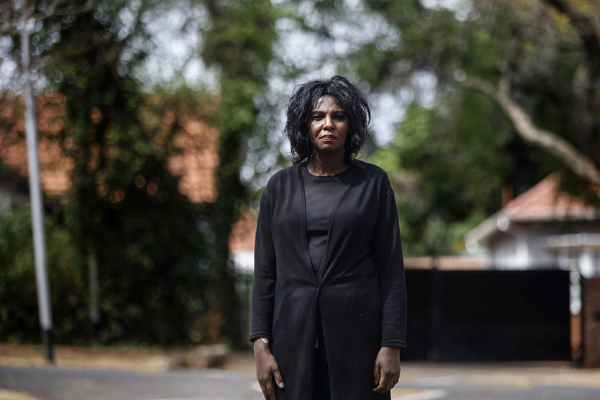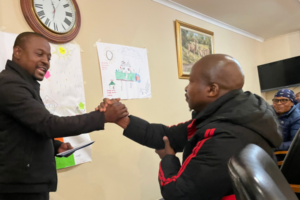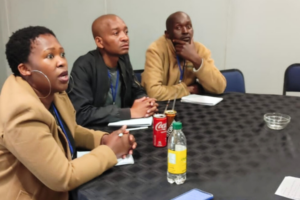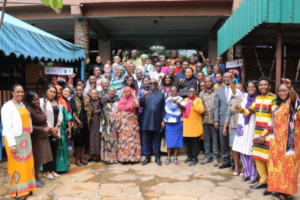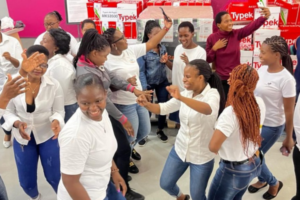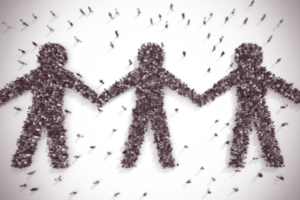We clean houses, do laundry and pick up after children and adults. About one million of us make up South Africa’s labour force, yet we are invisible to most people. My name is Pinky Mashiane and I am a 48 years old domestic worker and founder of the United Domestic Workers of South Africa (UDWOSA). Through UDWOSA, I am determined to continue proving that we matter and are critical to our country’s economy.
I have worked as a domestic worker for 18 years while rearing my now 20-years-old daughter. Domestic workers in South Africa are mostly black and female. Our problems are well-documented, from low pay and long working hours to abuse and a law that won’t fathom our work can also be hazardous.
I wasn’t always conscious of my rights as a domestic worker. Shortly after I started my career in 2000 I joined the South African Domestic Service and Allied Workers Union (SADSAWU) and learned about the relevant labour laws, including the Labour Relations Act, the Basic Conditions of Employment Act and the sectoral determination that sets the minimum wages, working hours, number of leave days and termination rules for domestic workers.
I believe every worker in South Africa must have the opportunity to fully claim his or her rights. To claim these rights, one must first know them. Unfortunately, not everyone does. I became an organiser at SADSAWU to ensure that all domestic worker know their rights and that every labour law caters to our sector.
UDWOSA (the union I founded) is growing fast, with a little over 200 members in Tshwane and Ekurhuleni. We plan to start recruiting members in Western Cape and Mpumalanga Provinces in 2019. Organising domestic workers is very difficult because we work in our employers’ private homes, isolated from one another. As a union, we have to be creative in our recruiting and organising efforts. I have found the trains in Gauteng Province particularly useful for organising. While travelling in trains, my colleagues and I have robust discussions about issues that affect us as workers, including our working conditions, the national minimum wage, UIF and violence at the workplace.
My turning point
One day in 2001 I was going to visit my sister when I saw an employer assaulting his gardener who was an elderly man. The man slapped the worker so hard I reeled as if he’d slapped me. The elderly gardener could have been my father or uncle! Strangely, my feet refused to move towards my original destination and I found myself at that man’s gate confronting him. I pretended I was a labour inspector who’d witnessed a worker being abused. I asked the man to name the law that permitted him to assault his employee. He invited me into his home and I realised he was afraid that I would report the incident. I confessed I wasn’t from Department of Labour. Still, he apologised to the worker and I thought to myself: ‘If I can get this man to apologise to his gardener in my presence, then surely I can do more!’ I haven’t looked back since. My quest is to ensure every domestic worker has just and favourable conditions at work.
Domestic workers are in danger
The domestic workers’ fight is far from over. We are still treated badly despite the collective efforts to improve our working conditions over the years. We do critical work that enables you to do your bit growing our economy. Yet, many of you don’t think our work is decent work despite the ILO convention stating so. The fact that we aren’t covered by the Compensation for Occupational Injuries and Diseases Act (COIDA), which allows other workers to claim for injuries sustained at the workplace, is deeply insulting and unconstitutional.
COIDA excludes domestic workers in the way it defines an employee as “a person who has entered into or works under a contract of service or of apprenticeship or learnership, with an employer … but does not include … a domestic employee employed as such in a private household”. That means we can’t claim from the Compensation Fund because according to the law, our employers don’t have to contribute to the fund.
The Compensation Fund’s main reason for excluding us is because some of us work for more than one employer and it would, therefore, be ‘a logistical nightmare to implement well’. Our contention is this is a non-issue. COIDA can be implemented in a similar way as the Unemployment Insurance Act, which includes domestic workers.
The majority of us (almost 80%) are the sole providers for our families. What happens to the families of thousands of caregivers, drivers and gardeners who get hurt or die due to the work they do?
A study commissioned by Solidarity Center to look into incidences of workplace injury among domestic workers in South Africa offers rich insight into this issue. I personally know many domestic workers who’ve suffered injuries or death at work. Take David Ngobeni who slipped off a stepladder while cleaning windows at work in 2011 and fell. His employer kicked him to the kerb immediately he got injured and didn’t bother to take him to the hospital. David is now handicapped and he wasn’t compensated. The case of Joan who was bitten by a dog at work and later died in the hospital is still fresh in my memory. And I can’t forget Maria Mahlangu who drowned in 2012.
Maria was cleaning windows when she fell into a nearby pool, which was not covered. Her employer who was at home during the incident found Maria hours later. He said he could only offer some R2,500 to the grieving family and dependents (a daughter and grandchild). If Maria had a different job other than as a domestic worker, her dependents wouldn’t have been left destitute.
Challenging the constitutionality of COIDA
And so Maria’s daughter is challenging the constitutionality of COIDA. The case, which has wide support from especially the domestic workers’ unions and the nonprofit, Solidarity Centre, is currently before the Pretoria High Court. Since 2011, Labour Minister, Mildred Oliphant, hasn’t acted on her promise to amend COIDA to include domestic workers. We support Mahlangu’s daughter’s argument in the case that the department’s laxity in taking action is unconstitutional.
As things stand, the only recourse is for us to sue our employers for compensation for injuries or death. We are saying that’s unreasonable considering how much time and money litigation takes.
Meanwhile, public submissions to the COIDA Amendment Bill 2018 closed on December 18. [See the campaign here]. I am optimistic that the minister will sign the bill because of the pressure of the imminent court case and the advocacy work we’ve done around this issue. Our view is that the Minister must compensate Maria’s family and other families of domestic workers who can prove that they were injured or died at work since 1994. Our COIDA campaign will go on until those families and workers are compensated.
The voices of domestic workers must be heard, and I am happy to note the #HearMeToo theme of this year’s 16 Days of Activism for No Violence Against Women and Children campaign. Gender-Based Violence (GBV) affects many of us both at work and in our homes. The abuse must end now! I urge my colleagues to speak out about their struggles with GBV and let us support each other. As a union, we’ve partnered with experts who can help GBV survivors.
We’ve made some wins so far, but I look forward to the day all the domestic workers in the world will be respected and given their rights. There’s still a long way to go, but together we can achieve decent work for all.
Update: In 2019, the Pretoria high court ruled the exclusion of domestic workers from COIDA is unconstitutional.


